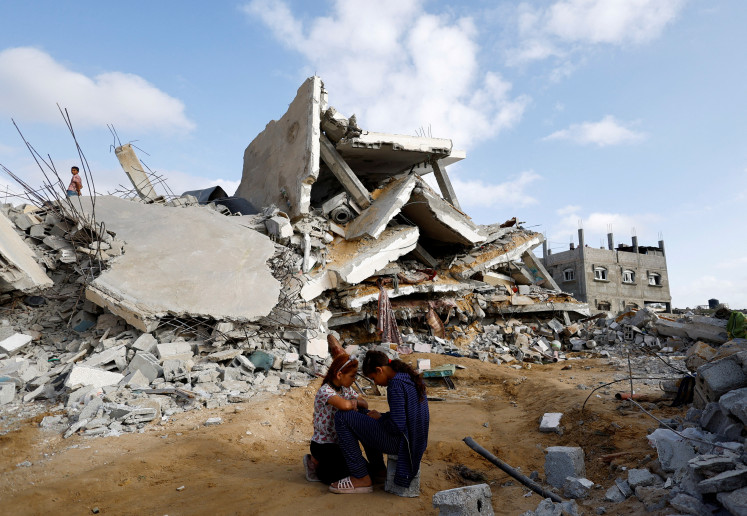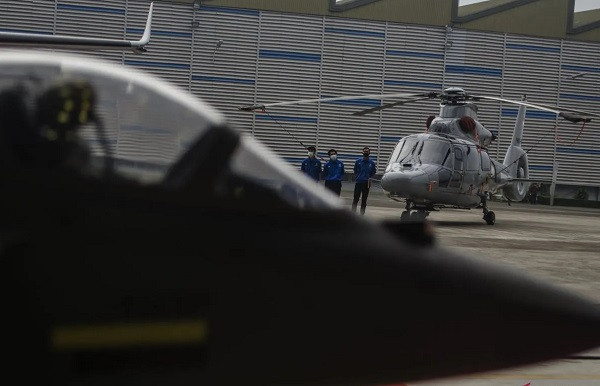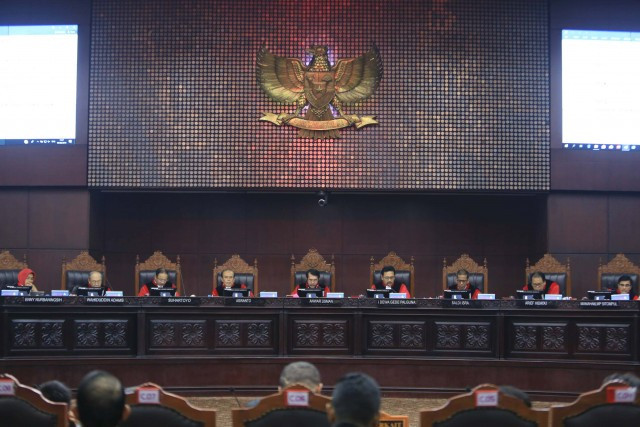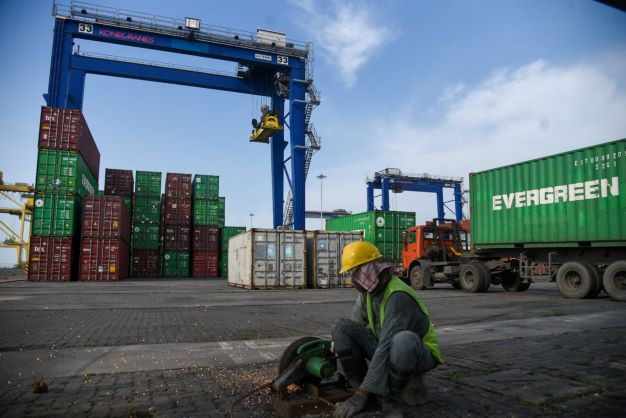Analysis: Post-pandemic, pharma SOEs beset with financial problems
Change Size
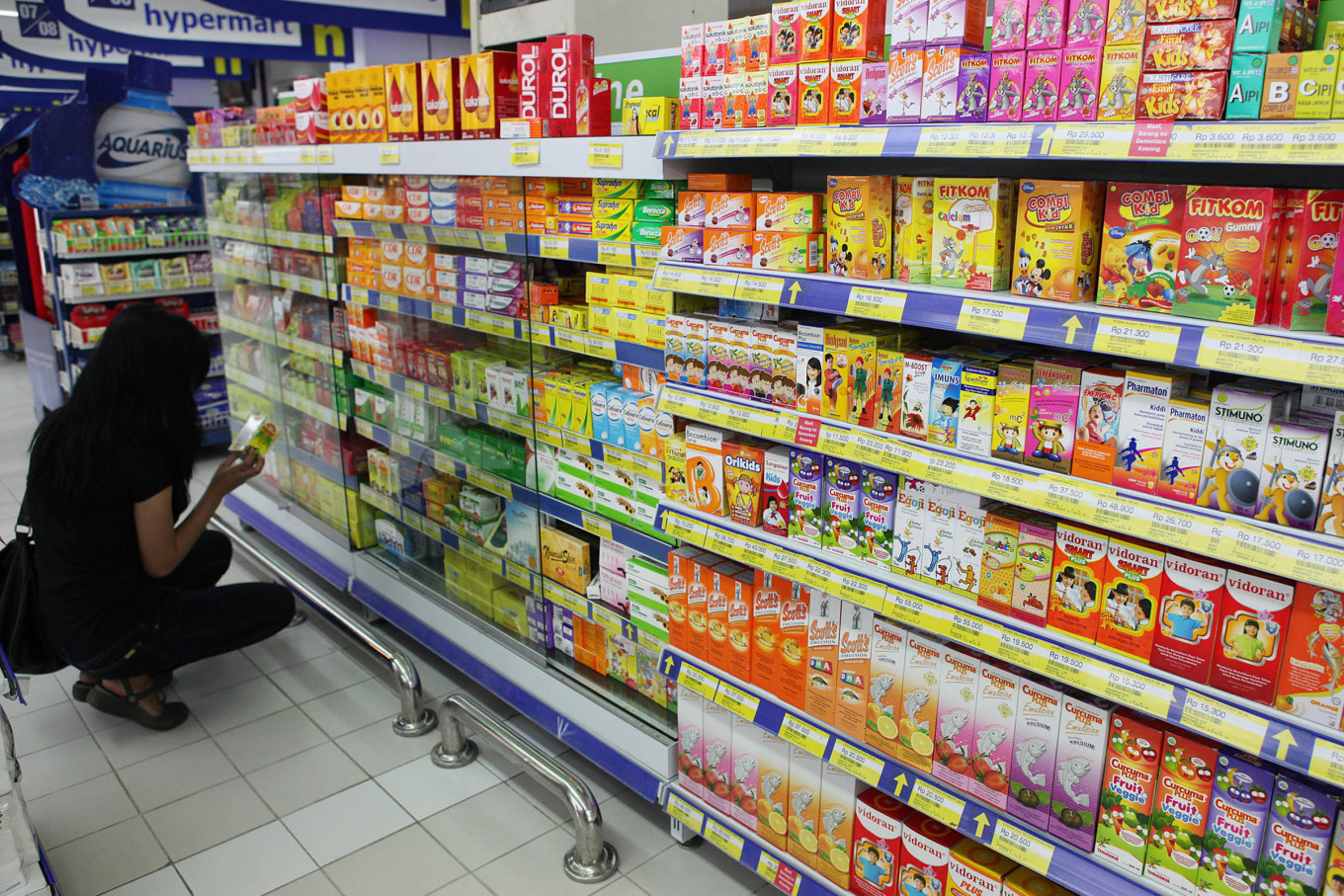 A consumers chooses drugs at Hypermart, Jakarta, Tuesday (26/03). Imports of pharmaceutical raw materials are estimated to increase by 15 percent in the first quarter of 2013 to US $ 335.8 million from the same period in 2012 of US $ 292 Million. Due to high demand for drugs in the domestic market. (JP/Nurhayati/Adi)
A consumers chooses drugs at Hypermart, Jakarta, Tuesday (26/03). Imports of pharmaceutical raw materials are estimated to increase by 15 percent in the first quarter of 2013 to US $ 335.8 million from the same period in 2012 of US $ 292 Million. Due to high demand for drugs in the domestic market. (JP/Nurhayati/Adi)
A
fter reaping profits at the height of the COVID-19 pandemic, Indonesia’s pharmaceutical industry is now facing a weakening economy. State-owned pharmaceutical companies have been hit hardest, with problems that include significant debt, expired vaccines and a high risk of bankruptcy. Private pharma companies, meanwhile, have booked positive performances.
According to Indonesian Pharmaceutical Association (GP Farmasi) executive director Elfiano Rizaldi, the change in the performance of pharmaceutical companies in the country is influenced by decreasing demand for medications and medical equipment that was previously rampant throughout the pandemic. During that time, pharmaceutical companies had acquired medications and medical equipment needed to deal with the pandemic, but many are now left spare as the country moves past the pandemic.
This is reflected in state-owned PT Indofarma (INAF), which has been struggling financially over the past years. In the first six months of this year, Indofarma had racked up Rp 120.3 billion in losses. From 2020 to 2022, the company had also booked consecutive losses of Rp 3.6 billion, Rp 37.5 billion and Rp 428.4 billion. Worse, Indofarma booked staggering debt of Rp 1.49 trillion, leaving the company in negative equity, and thus unable to get new loans. Consequently, the company cannot pay its obligations.
Recently, the company announced that it had resolved its debt payment obligations (PKPU) lawsuits filed by two of its business partners, PT Solarindo Energi Internasional and PT Trimitra Wisesa Abadi, on June 8. Indofarma owes the two companies Rp 17.1 billion and Rp 19.8 billion, respectively. In additon, other companies also still hold bills for Indofarma, including PT Widatra Bakti Laboratories, PT Catur Dakwah Crane Farmasi and PT Merapi Utama Pharma.
The Indonesia Stock Exchange (IDX) has placed Indofarma on a special monitoring board since August in an effort to protect investors. Indofarma stock prices dipped to one of their lowest levels in history at Rp 430 on Thursday, down from its highs of Rp 5,650 in January 2021 and Rp 6,500 in December 2018.
Another state-owned pharma company PT Kimia Farma (KAEF) is also in trouble. It booked a net loss of Rp 21.7 billion in the first six months of this year. For the whole period of last year, the company booked a net loss of Rp 206.3 billion. Kimia Farma currently bears the burden of unsold vaccines worth Rp 339 billion for the government’s Gotong Royong Vaccination program involving private businesses.
Kimia Farma president director David Utama claims that he is optimistic that the company can earn revenues of up to Rp 11 trillion and make a net profit of Rp 130 billion this year. However, with Kimia Farma’s unsold vaccines, the potential for the company to incur further losses looms.
The worsening situations of Indofarma and Kimia Farma has put extra weight on already burdened state-owned pharmaceutical holding company PT Bio Farma, of which Indofarma and Kimia Farma are parts. As of July 2023, Bio Farma had a financial burden of Rp 700 billion due to expired stock, particularly of COVID-19 products. Also, the holding company’s operating cash flow is also worsening along with a total balance decrease of Rp 900 billion from the years 2021 to 2023. The expired products are said to have affected the company’s working capital turnover.
What’s more
While state-owned pharmaceutical companies face multiple issues, the same does not apply to private publicly listed pharmaceutical companies, which have seen improving performances and increased profits in the last few years, according to data from the IDX.
PT Kalbe Farma (KLBF), for instance, saw increased profits of up to Rp 2.73 trillion in 2020, Rp 3.18 trillion in 2021, and Rp 3.38 trillion in 2022. In the first half of this year, the company booked net profits of Rp 1.5 trillion, on total revenue of Rp 15.1 trillion. The company’s market capital at the IDX currently stands at Rp 84 trillion.
Herbal products manufacturer PT Industri Jamu dan Farmasi Sido Muncul (SIDO) booked net profits of Rp 1.10 trillion in 2022. Though a decrease from the previous year’s Rp 1.3 trillion net profits, 2021’s net profits saw a 35 percent year-on-year increase. In the first six months of this year, SIDO booked net profits of Rp 448 billion, with a market capitalization of Rp 17 trillion. The company’s pharmaceutical segment, although accounting for a small segment of 3.7 percent of total revenue, had notably increased in sales, from Rp 137.1 billion in 2021 to Rp 143 billion 2021.
Another private pharmaceutical company PT Tempo Scan Pacific also saw profits of Rp 834 billion in 2020, Rp 823 billion in 2021 and Rp 1 trillion in 2022. In the first half of this year, the company booked 692.8 billion in net profits, with total sales reaching Rp 6.4 trillion. The company’s market cap totalled Rp 8 trillion.
Other private publicly listed pharmaceutical companies such as PT Pharos (PEHA), PT Pyridam Farma (PYFA), PT Darya-Varia Laboratoria (DVLA), PT Soho Global Health (SOHO) had booked positive performances until last year. In the first half of this year, these companies, except PYFA, booked increased profits.
What we’ve heard
Several sources at state-owned enterprises (SOEs) mentioned that the losses suffered by Indofarma were a result of the company's excessive overestimation in procuring healthcare equipment during the pandemic. Indofarma, along with other state-owned pharmaceutical companies like Kimia Farma, did not anticipate the pandemic ending sooner than their predictions.
Indofarma had already excessively procured a variety of medicines and healthcare products related to COVID-19 management. The procurement process for these healthcare products was suspected to be problematic and contrary to the company's governance. This includes the procurement of masks (INAmask) and COVID-19 drugs such as remdesivir and oseltamivir, which are now stockpiled in Indofarma's warehouses.
In the case of INAmask procurement, Indofarma allegedly inflated the company's performance by recording transactions with buyers as sales to Promedik, one of Indofarma's subsidiaries. On paper, Indofarma and Promedik had a distribution agreement. However, in practice, all sales and deliveries to buyers were still handled by Indofarma. Now, millions of INAmask masks are struggling to be sold because their prices are higher than similar masks from other providers.
One source revealed that Indofarma's business team did not carefully calculate the business projections for healthcare equipment needed to manage COVID-19. Besides the inaccurate calculations, government assignments to state-owned pharmaceutical companies during the pandemic also added to Indofarma's losses.
Most of the healthcare equipment was obtained through borrowing from various vendors. Moreover, it was eventually revealed that Indofarma's products were not as competitive in the market as expected. Due to the lack of demand, Indofarma incurred losses from 2020 to 2022.
The company delayed debt payments, leading it to face legal action from its suppliers. What infuriated the vendors was that the money from the sale of healthcare products was reinvested by Indofarma to buy other COVID-19 products and medicines, as opposed to paying off its debts. Consequently, healthcare equipment and medicines continued to accumulate. As the pandemic began to subside, Indofarma’s struggle to sell these products only worsened.
Additionally, a Supreme Audit Agency (BPK) audit examined Indofarma and detected possible signs of foul play in the procurement of healthcare equipment. The auditor suspected fictitious transactions between Indofarma and one of its vendors.
Disclaimer
This content is provided by Tenggara Strategics in collaboration with The Jakarta Post to serve the latest comprehensive and reliable analysis on Indonesia’s political and business landscape. Access the latest edition of Tenggara Backgrounder to read the articles listed below:
Politics
- Ganjar-Mahfud announcement amid Jokowi’s wavering support
- Court ruling paves way for Jokowi’s political dynasty
- Muslim-majority Indonesia's limited diplomatic leverage in Middle East
- Indonesian SOEs accused of supplying arms to Myanmar junta
Business and Economy
- GOTO faces shareholder backlash following private placement
- Israel-Hamas war’s impact on RI’s economy
- Indonesia’a trade surplus rises, despite falling exports






